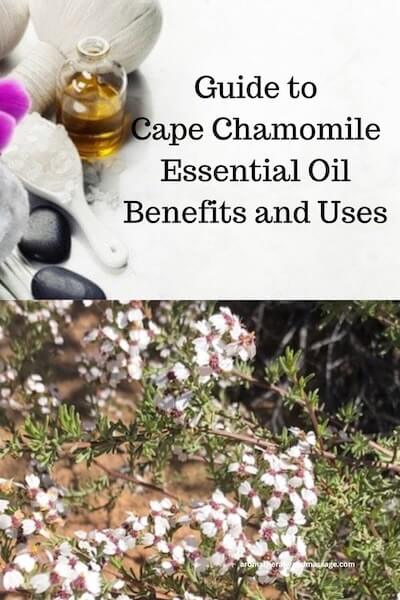Cape chamomile essential oil (Eriocephalus punctulatus) is sometimes difficult to obtain and varies considerably depending on where it is grown.
Plant family: Asteraceae
Production: Steam distilled from the flowering tops of the highly aromatic plant, a woody, evergreen shrub native to South Africa. The plant’s only relationship to roman or german chamomile is that they belong to the same plant family.
Aroma: Like sweet apples, with floral notes and an earthy, herbaceous undertone, according to Aromatics International.
Perfume/Aromatic note: Middle to top
Is cape chamomile safe to use during pregnancy? Consult a professional.
Is cape chamomile essential oil safe for children? Consult a professional.
Cautions: The oil is prone to oxidation—store it away from light and heat.
Main components:
- 2-methylbutyl 2-methylpropanoate ~24%
- linalyl acetate ~14%
- 2-methylpropyl 2-methylpropanoate ~8%
- 2-methylbutyl 3-methylpropanoate ~6%
Source: Essential Oil Safety, 2nd Edition. The book notes that little information is available about cape chamomile oil or most of its constituents. However, the oil is composed of 80% esters, similar to those found in roman chamomile essential oil.
Cape Chamomile Aromatherapy Benefits
Aromatherapy: A Complete Guide to the Healing Art: Cape chamomile contains azulene, giving the oil its blue color. This essential oil helps relieve stress and depression, promote sleep, reduce pain, and support digestion and is considered a restorative tonic that may benefit the liver and nervous system.
Oshadhi: Cape chamomile contains significant amounts of azulene, which helps relieve inflammation. However, the amount of azulene—and the resulting blue color—varies with the proportion of the flowers used by the distiller, which depends on the harvest. More flowers produce a paler color, which doesn’t affect the anti-inflammation properties. The oil’s composition varies greatly from batch to batch, depending on climate and soil conditions.
Aromatics International: Cape chamomile soothes the skin, calms emotions, and supports you through long-term stress, helping you maintain peace of mind. Suggested uses:
- Diffuse the oil at night to help you sleep.
- Add the oil to salves to help calm skin irritation and relieve itchy, cracked, or dry skin.
- Use the essential oil in a massage oil to help relieve muscle tightness.
Aromatic Studies: Cape chamomile is calming and soothing, helping relieve stress and anxiety. The oil also relieves itchiness, soothes inflammation, and helps heal both emotional and physical wounds.
Cape Chamomile Essential Oil Uses and Blends
Healing Facial Oil
- 5 drops cape chamomile
- 5 drops myrrh essential oil
- 4 drops helichrysum essential oil
- 6 drops sandalwood essential oil
- 1 tablespoon calendula herbal oil
- 1 tablespoon rosehip seed oil
Combine all ingredients in a small glass bottle. Cap bottle and shake well. Use a few drops daily on you face.
Source: Aromatics
Bug Bite Relief Gel
- 2 ounces (4 tablespoons) aloe vera gel
- 1 tablespoon lavender hydrosol
- 1 tablespoon calendula oil
- 10 drops cape chamomile essential oil
- 20 drops lavender essential oil
Blend all ingredients. (A flip-top PET bottle works well.) Apply gel as needed to irritated skin.
Source: Jade Shutes, NAHA Aromatherapy Journal, Summer 2013.2, p. 60.
Anxiety Calming Roll-On
Combine all the oils in the bottle. Snap the roller ball top into place. Use throughout the day as needed.
Source: Aromahead
Diffuser Blend for Sleep
- 6 drops vetiver essential oil
- 3 drops cape chamomile essential oil
Source: Aromahead
Relaxing Bath Salts
- 4 ounces (1/2 cup) pink himalayan salt
- 1 tablespoon jojoba oil
- 3 drops cape chamomile
- 2 drops cedarwood essential oil
In a four-ounce container, combine the pink salt, jojoba, and essential oils, stirring with a stainless steel spoon. Stir the salt into a bathtub full of water. Relax!
Source: Aromahead
Prosperity Bath Salts
- 2 ounces (1/4 cup) of your favorite salt
- 3 drops cape chamomile
- 3 drops sweet basil (ct linalol) essential oil
- 3 drops bergamot essential oil
Blend essential oils into salt. Add to bath.
Source: Stillpoint Aromatics
Eriocephalus punctulatus Photo Credit: ©tobielouw, CC-BY-NC from Inaturalist
